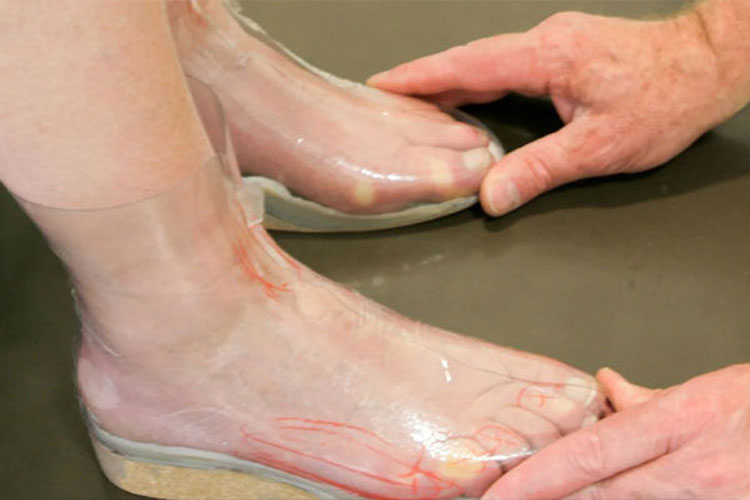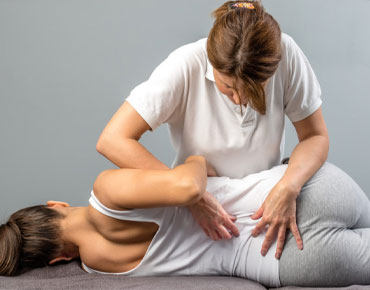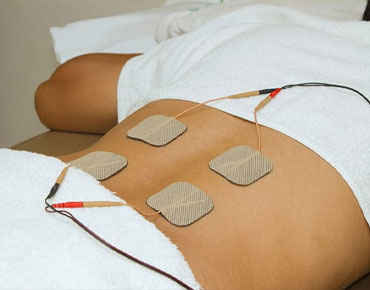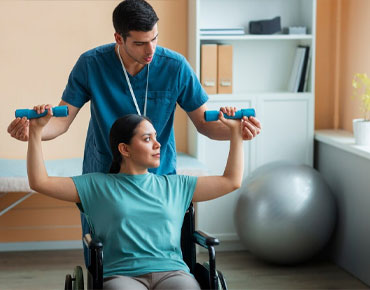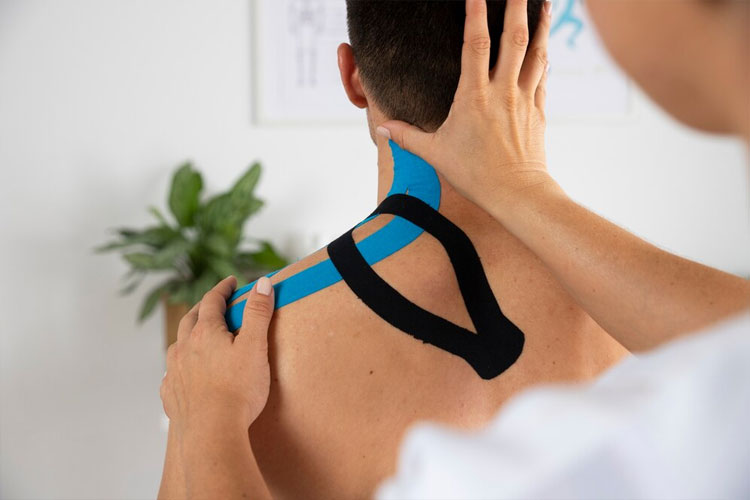
MindBody Physiotherapy & Wellness Clinic
- 107 Hawthorn Way Unit 6, Leduc, AB T9E 0B1
- Mon to Fri 9:00am to 6:00pm
-
Call us anytime
+1 (587) 468-1818
-
Write a mail
info@mindbodyphysio.ca
- Book Appointment
Blog Details
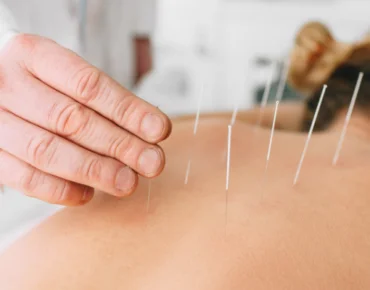 Sat Feb 17
Sat Feb 17
What is Acupuncture? | How long does acupuncture last
Have you ever wondered what acupuncture and Chinese medicine are all about? This ancient practice, originating in China and also known as TCM, has been gaining popularity worldwide as an alternative therapy. It involves the insertion of thin needles by acupuncturists into specific points on the body, aiming to balance the flow of energy. But how does it work?
Acupuncture, a complementary therapy in Chinese medicine, works by stimulating trigger points on the body using thin needles. These needles are inserted by licensed acupuncturists into specific points that correspond to different organs or systems within the body. The technique aims to restore balance between yin and yang energies, promoting overall well-being. Acupuncture is a popular alternative medicine practice.
Studies have shown that acupuncture, a form of alternative medicine and complementary therapy commonly used by acupuncturists, can be effective in treating various conditions such as pain management, stress reduction, and even infertility. During an acupuncture session, patients may experience a sensation known as "de qi," which is often described as a dull ache or tingling feeling around the needle insertion site.
With its long history and growing popularity, acupuncture, a form of alternative medicine and a complementary therapy rooted in Chinese medicine, continues to be researched and analyzed for its potential benefits. So if you're curious about this ancient healing art practiced by acupuncturists, let's delve deeper into the world of acupuncture and discover how it can potentially improve your health and well-being.
Remember, always consult with qualified acupuncturists specializing in Chinese medicine and moxibustion before starting any alternative medicine acupuncture sessions or treatments.
How Acupuncture Works: Understanding the Mechanisms
Stimulates nerves, muscles, and connective tissues
Acupuncture, a traditional Chinese medicine practice, is a treatment performed by acupuncturists. It involves the insertion of thin needles into specific acupuncture points to stimulate nerves, muscles, and connective tissues. This triggers a therapeutic response, leading to various effects. Another common technique used by TCM practitioners is moxibustion.
When acupuncturists insert needles into the acupuncture points, they create a micro-trauma that activates the body's natural healing response in the context of alternative medicine. This stimulation prompts increased blood flow to the area, bringing with it oxygen and nutrients necessary for tissue repair in the field of Chinese medicine. It encourages the release of anti-inflammatory substances that reduce swelling and pain, complementing the use of moxibustion
Triggers release of endorphins, natural painkillers
One of the key mechanisms behind alternative medicine, specifically acupuncture, is its ability to trigger the release of endorphins - our body's natural painkillers. Acupuncturists use this technique as part of Chinese medicine to help alleviate pain and produce feelings of relaxation and well-being. Another technique commonly used in Chinese medicine is moxibustion.
As acupuncturists insert needles into specific acupuncture points on your body, they stimulate nerve fibers that send signals to your brain. In response, your brain releases endorphins, which act as powerful analgesics. These endorphins, a key component of Chinese medicine, not only help relieve pain but also promote a sense of calmness and euphoria. Moxibustion, a technique used in alternative medicine, can also be combined with acupuncture to enhance its effects.
Modulates neurotransmitters for improved well-being
Acupuncture, a practice commonly used by acupuncturists in Chinese medicine (TCM), has been found to modulate neurotransmitters in our bodies. This alternative medicine technique can lead to improved overall well-being by affecting the chemical messengers that transmit signals between nerve cells in our nervous system.
Acupuncture, a practice rooted in Chinese medicine, is an alternative medicine technique used by acupuncturists. By targeting specific acupuncture points, it can influence neurotransmitter levels and have positive effects on mood and emotions. For instance, studies have shown that acupuncture can increase serotonin levels, helping alleviate symptoms of anxiety and depression.
Enhances blood circulation and promotes healing
Another way acupuncturists use acupuncture is by enhancing blood circulation and promoting healing. Acupuncture, a technique used in Chinese medicine (TCM) and alternative medicine, stimulates the release of nitric oxide, a vasodilator that relaxes blood vessels and improves blood flow.
Acupuncture, a popular alternative medicine treatment in Traditional Chinese Medicine (TCM), can benefit acupuncturists by improving blood circulation. This enhanced circulation promotes the efficient delivery of oxygen and nutrients to damaged tissues, facilitating the healing process. Additionally, acupuncture helps remove metabolic waste products from affected areas, aiding in recovery.
Benefits of Acupuncture: Managing Pain and Promoting Healing
Relieving Chronic Pain Conditions
Acupuncture treatment, a form of traditional Chinese medicine (TCM), has been proven effective in providing relief for chronic pain conditions such as back pain, migraines, joint pain, and neck pain. Unlike traditional pain medications, acupuncture offers a natural alternative. By targeting specific points on the body with thin needles, this TCM practice stimulates the release of endorphins, the body's natural painkillers. Multiple studies have shown its efficacy in providing long-lasting relief from persistent discomfort, making it a viable option for those seeking relief from cancer-related pain.
Reducing Inflammation and Accelerating Tissue Repair
In addition to its pain-relieving properties, acupuncture is an effective treatment for reducing inflammation and promoting faster tissue repair. This traditional Chinese medicine has positive effects on individuals suffering from conditions like myofascial pain or those recovering from injuries. By improving blood circulation to affected areas and stimulating the body's healing response, acupuncture aids in reducing swelling and promoting tissue regeneration in China.
Alleviating Stress, Anxiety, and Depression Symptoms
Beyond physical ailments such as back pain, acupuncture treatment in China is known to have positive effects on mental health as well. It has been shown in studies to alleviate symptoms of stress, anxiety, and depression by promoting relaxation and balancing the body's energy flow. The insertion of needles at specific acupoints triggers the release of neurotransmitters like serotonin and endorphins that help regulate mood. As a complementary therapy to conventional medicine or counseling, acupuncture can contribute significantly to overall mental well-being.
Improving Sleep Quality and Boosting Immune System Function
Sleep issues can greatly impact one's quality of life. Acupuncture, a traditional Chinese medicine treatment, offers a potential solution by improving sleep quality naturally without relying on medication. By addressing underlying imbalances within the body that may disrupt sleep patterns, such as stress or hormonal fluctuations, acupuncture from China can help individuals achieve more restful nights.
Furthermore, regular acupuncture sessions have been found to enhance immune system function in participants. A strengthened immune system can better defend against illnesses and infections while promoting overall health. This is particularly beneficial for individuals with compromised immune systems or those seeking to optimize their well-being through medicine and treatment studies.
Incorporating Acupuncture into Your Healthcare Routine: Practical Tips and Advice
Consult with a licensed acupuncturist for personalized treatment plan
When considering incorporating acupuncture into your healthcare routine, it's crucial to consult with a licensed acupuncture practitioner in China. These professionals have undergone extensive training in the principles and techniques of acupuncture medicine. By seeking their expertise, you can ensure that you receive a personalized treatment plan tailored to your specific needs, with the use of needles on participants.
During your consultation with Chinese acupuncture practitioners, discuss any existing medical conditions or medications you are currently taking. This information is vital for the acupuncture practitioners to develop an effective and safe treatment strategy for your acupuncture sessions. By providing comprehensive details about your health history, you enable them to make informed decisions regarding your care during these early acupuncture sessions.
Be open about your expectations and concerns during sessions
Open communication is key when undergoing acupuncture treatment. It's important to be transparent about your expectations and concerns throughout the sessions. By expressing what you hope to achieve from acupuncture medicine, whether it's pain relief, stress reduction, or improved overall well-being, the acupuncturist can adjust their approach accordingly to meet the needs of the participants.
If you have any reservations or fears about acupuncture needles or the procedure itself, don't hesitate to voice them. A skilled practitioner will take the time to address your anxieties and provide reassurance. Remember that acupuncture is generally a gentle and minimally invasive treatment that many participants find relaxing.
Consider combining acupuncture with other holistic approaches
Acupuncture, a Chinese treatment involving the use of needles, is often used in conjunction with other holistic approaches to enhance its effectiveness. If you're interested in exploring alternative medicine options alongside acupuncture, discuss this with your acupuncturist from China. They may recommend complementary practices such as herbal medicine, massage therapy, or dietary changes that can further support your health goals.
In addition to alternative therapies, integrating acupuncture treatment into your healthcare routine can also involve collaborating with other medicine providers in China. Maintaining open lines of communication between all practitioners involved ensures a comprehensive approach tailored specifically to your needs, including the use of acupuncture needles.
Seek referrals and gather health information
When searching for an acupuncture practitioner specializing in medicine, seek referrals from trusted sources such as friends, family, or other healthcare professionals. Personal recommendations can provide valuable insights into the quality of care and treatment with needles you can expect. Consider researching online reviews and testimonials from participants to further inform your decision.
Furthermore, gathering health information pertaining to acupuncture treatment can help you make informed choices. Familiarize yourself with clinical practice guidelines and research studies that support the efficacy of acupuncture for various conditions. This knowledge empowers you to actively participate in your own healthcare decisions, especially when considering acupuncture as a medicine in China with participants.
Incorporating acupuncture, a traditional Chinese medicine treatment, into your healthcare routine offers a holistic approach to wellness. By consulting with a licensed Chinese acupuncturist, being open about your expectations and concerns, considering complementary therapies, and seeking referrals while gathering health information, you can embark on a journey towards improved health and well-being.
Remember to consult with a healthcare provider, such as medicine practitioners, before making any significant changes to your medical care or treatment plan, especially when it comes to acupuncture sessions. It is important to consider potential adverse events that may occur during these sessions.
Exploring Different Types of Acupuncture: From Traditional Chinese to Korean
Traditional Chinese Medicine (TCM) acupuncture focuses on meridians and Qi flow
In the world of acupuncture, Traditional Chinese Medicine (TCM) from China holds a prominent place. This ancient practice is deeply rooted in the belief that an imbalance in the body's energy, known as Qi, can lead to various health issues. TCM acupuncture aims to restore harmony by stimulating specific points along the body's meridians. Numerous studies have been conducted to evaluate the effectiveness of this treatment, with participants from different backgrounds.
The needles used in Chinese medicine acupuncture, also known as TCM acupuncture, are typically thin and flexible. They are inserted into strategic points to regulate the flow of Qi and encourage healing. Practitioners may employ other techniques such as cupping or moxibustion, where dried herbs are burned near the skin to stimulate energy flow. China is known for its traditional medicine and treatments like acupuncture.
Japanese acupuncture uses thinner needles with gentler techniques
Japanese acupuncture, a form of treatment, differs slightly from Chinese acupuncture. The focus is on gentle needling techniques and using even thinner needles, aiming to minimize discomfort while effectively targeting specific points along the body's meridians. This approach has been studied extensively with participants in various studies to understand its effectiveness in medicine.
Practitioners of Japanese acupuncture often emphasize palpation skills, relying on touch and feedback from the patient's body to determine optimal needle placement. This style also places importance on treating underlying imbalances rather than solely addressing symptoms. Japanese acupuncture is a treatment method that incorporates Chinese medicine principles and techniques. The practitioners use their palpation skills to provide effective treatment for participants.
Korean Hand Therapy targets specific points on the hand for various ailments
Korean Hand Therapy (KHT), also known as Koryo Hand Therapy, is a unique form of acupuncture that primarily focuses on treating ailments through stimulation of specific points located on the hand. These hand reflexology points correspond to different parts of the body. This traditional Chinese medicine technique has been studied extensively, with numerous studies showing positive results in participants.
By applying pressure or inserting tiny needles into these hand points, Chinese medicine practitioners believe they can effectively address a wide range of health conditions throughout the body. KHT offers a convenient alternative for participants who may have difficulty accessing other types of acupuncture due to physical limitations or preferences. Studies have shown the effectiveness of this Chinese medicine technique.
Auricular acupuncture involves stimulating ear points for overall health benefits
Auricular acupuncture, as the name suggests, involves stimulating specific points on the ear. This approach is based on the belief that the ear represents a microsystem of the entire body, with each point corresponding to different organs or systems. Participants in Chinese medicine studies often undergo auricular acupuncture to explore its potential benefits.
Chinese medicine practitioners may use small needles, seeds, or even electrical stimulation to activate these ear points. Auricular acupuncture studies often utilize this technique as a complementary therapy for various conditions such as pain management, addiction recovery, and stress reduction. Participants in these Chinese medicine studies benefit from auricular acupuncture.
FAQs
1. Can acupuncture help with anxiety and stress?
Chinese medicine studies have shown that acupuncture has positive effects on reducing anxiety and stress levels. By stimulating specific points on the body, acupuncture helps promote relaxation and balance in the nervous system.
2. Is acupuncture safe?
When performed by a trained and licensed Chinese acupuncturist, acupuncture is generally considered safe. The use of sterile needles and adherence to proper hygiene practices minimize any potential risks or complications associated with this traditional Chinese medicine practice. Numerous studies have shown the effectiveness of acupuncture in treating various health conditions.
3. How long does an acupuncture session typically last?
The duration of a medicine acupuncture session can vary depending on individual needs and treatment plans. On average, studies show that a session may last between 30 minutes to an hour.
4. How many sessions of acupuncture are needed to see results?
The number of sessions required for acupuncture treatment varies depending on the specific condition being treated, its severity, and individual response to treatment. Some people may experience improvements after just a few sessions with an acupuncture practitioner, while others may require several weeks or months of regular treatments. This is true for both early acupuncture and medical acupuncture.
5. Does acupuncture hurt?
Acupuncture, a form of medicine, involves the insertion of thin needles into specific points on the body. This process may cause minimal discomfort or a slight sensation upon insertion. However, most people find acupuncture relatively painless.
6. Can children receive acupuncture treatments?
Yes, children can receive acupuncture treatments for their health conditions. These treatments are provided by qualified pediatric acupuncturists who specialize in children's medicine.
7. Is there scientific evidence supporting the effectiveness of acupuncture?
Numerous studies, including those in medicine, have demonstrated that acupuncture can be effective in managing various conditions such as chronic pain, migraines, and nausea. However, more research is still needed to further understand the mechanisms and expand its applications, among others.
Remember, always consult with a qualified healthcare professional or acupuncturist for personalized advice and guidance regarding your specific health concerns, especially when considering acupuncture treatment. Acupuncture needles are used in medical acupuncture sessions to provide therapeutic benefits.
Key Takeaways on the Benefits and Applications of Acupuncture
In conclusion, acupuncture, a form of Chinese medicine, offers numerous benefits and applications for managing pain, promoting healing, and improving overall well-being. By understanding the mechanisms behind how acupuncture works, individuals can make informed decisions about incorporating it into their healthcare routine. Studies have shown that acupuncture is effective in pain management and has been subject to review.
Acupuncture, supported by numerous studies and review, works by stimulating specific points on the body, which helps to restore balance and promote the flow of energy. This ancient practice has been used for centuries in traditional Chinese medicine and has gained recognition worldwide for its effectiveness.
One of the key benefits of acupuncture is its ability to manage pain. Whether it's chronic pain conditions like arthritis or acute pain from injuries, acupuncture has shown promising results in providing relief. Studies have shown that this traditional Chinese medicine technique can effectively alleviate discomfort by targeting the underlying causes of pain, such as inflammation or nerve sensitivity. Acupuncture offers a natural alternative to relying solely on medication for pain management.
Furthermore, acupuncture, a traditional Chinese medicine practice, can also aid in promoting healing according to numerous studies and review. It stimulates blood circulation and triggers the release of endorphins, which are natural painkillers produced by our bodies. This not only helps with physical healing but also contributes to mental well-being by reducing stress and anxiety.
Incorporating acupuncture, a traditional Chinese medicine practice, into your healthcare routine can be a valuable addition to other treatments you may be receiving. It's important to consult with a qualified acupuncturist who can tailor the treatment plan according to your specific needs. They will take into consideration your medical history, current health condition, and any ongoing treatments you may be undergoing. Numerous studies have shown the benefits of acupuncture in medicine.
In conclusion, if you're seeking alternative methods for pain management, healing, and overall well-being, acupuncture, a traditional Chinese medicine practice, can be a valuable option to consider. By understanding its mechanisms and benefits, as shown in various studies, you can make an informed decision about incorporating it into your healthcare routine. Consult with a qualified acupuncturist to explore the possibilities and experience the potential benefits of this ancient practice.

